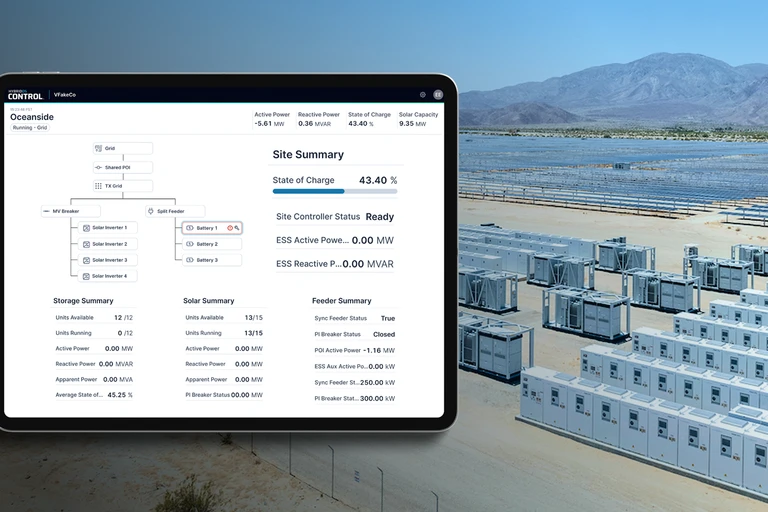In today’s rapidly evolving energy landscape, battery energy storage systems (BESS) are revolutionizing how we manage power supply, integrate renewable energy sources, and stabilize the grid. This comprehensive guide explores the critical role of BESS in enhancing energy management systems and how companies like FlexGen are pioneering advancements with their HybridOS software.
Understanding Battery Energy Storage Systems (BESS)
Battery energy storage systems are sophisticated technologies designed to store energy for later use. These systems are integral in managing energy supply fluctuations, enhancing grid stability, and maximizing the utilization of renewable energy sources. They store excess energy produced during low demand periods and release it during peak demand times, ensuring a constant and reliable energy supply.
Key Components of BESS
- Battery Management System (BMS): Ensures optimal performance and longevity of batteries by managing charge levels, temperature, and health of the battery cells.
- Power Conversion System (PCS): Converts electrical energy from AC to DC and vice versa, facilitating the charge and discharge cycles efficiently.
- Energy Management System (EMS): Integrates with the grid and renewable sources, optimizing energy use and distribution based on real-time data.
The Role of BESS in Renewable Energy Integration
Integrating renewable energy sources like solar and wind into the power grid is not without challenges, primarily due to their intermittent nature. BESS plays a crucial role in smoothing out the variability and ensuring a stable energy supply when renewable energy sources are not available.
- Storing Excess Energy: Solar panels and wind turbines can produce more energy than needed during certain times of the day or under specific weather conditions. BESS stores this excess energy instead of letting it go to waste.
- Providing Backup Power: During outages or insufficient solar/wind generation, the stored energy can be used to maintain grid stability without resorting to traditional fossil fuels.
FlexGen’s HybridOS: Enhancing BESS Performance
FlexGen, a leader in energy storage solutions, has developed HybridOS, an advanced energy management platform that significantly enhances the functionality and efficiency of BESS. This system provides:
- Real-time Monitoring and Control: Enables precise management of energy flows, optimizing the performance of both renewable integration and battery lifespan.
- Predictive Analytics: Uses data analysis to predict system needs and adjust parameters automatically for maximum efficiency and reliability.
- Seamless Integration: Compatible with various battery technologies and power infrastructure, ensuring flexible and scalable solutions for different energy needs.
Benefits of Advanced BESS for Commercial Energy Storage
Commercial entities can reap substantial benefits from implementing advanced BESS solutions, including:
- Reduced Energy Costs: By maximizing the use of cheaper renewable energy and reducing reliance on peak tariff periods.
- Increased Energy Security: Ensures uninterrupted power supply, critical for businesses that depend on constant energy availability.
- Lower Carbon Footprint: By using renewable energy more efficiently and reducing dependence on fossil fuel-based power generation.
Challenges in Battery Storage Technology
While BESS offers numerous benefits, there are challenges that need addressing to maximize its potential:
- High Initial Costs: The upfront investment for battery storage technology can be significant, though prices are decreasing as the technology evolves.
- Battery Lifespan and Efficiency: Developing battery technologies that offer longer lifespans and higher efficiencies is crucial for the long-term viability of BESS.
Looking Ahead: The Future of BESS
The future of battery energy storage is bright, with ongoing advancements in battery chemistries, management systems, and integration technologies. As we move towards a more sustainable energy grid, BESS will play a pivotal role in ensuring that the world’s energy needs are met efficiently and reliably.
FlexGen’s HybridOS exemplifies the type of innovation that will drive the next generation of energy management solutions, ensuring that battery storage not only supports but accelerates the global transition to renewable energy.
Frequently Asked Questions
- What is a Battery Energy Storage System (BESS)?
A BESS is a system that stores energy via batteries, typically using lithium-ion or flow batteries, for later use. It helps manage energy supply, integrate renewable energy, and stabilize the power grid. - How does BESS support renewable energy integration?
BESS stores excess energy generated during peak production times from renewable sources like solar and wind. This stored energy is then used when production decreases, ensuring a steady supply to the grid. - What are the benefits of FlexGen’s HybridOS?
FlexGen’s HybridOS enhances BESS operations by providing real-time monitoring, predictive analytics for system management, and seamless integration with various power infrastructures and battery technologies. - What challenges does BESS face?
Key challenges include high initial costs, the need for advanced battery management systems to extend battery life, and maintaining efficiency throughout the system’s lifecycle. - Why is BESS important for the future of energy?
BESS is crucial for a sustainable energy future as it allows for more effective use of renewable energy, reduces reliance on fossil fuels, and supports grid stability in face of varying energy production levels.
Conclusion
Battery storage energy management systems are essential in today’s energy strategy, balancing supply and demand, reducing energy costs, and promoting environmental sustainability. With technological advancements and companies like FlexGen leading the way, the potential for battery energy storage to transform our energy systems is unlimited.


